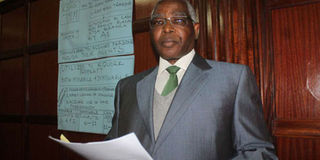Justice Aaron Ringera reveals why Anglo Leasing probe was delayed

Retired Justice Aaron Ringera in a Nairobi court, on July 23, 2017. He was testifying during the ongoing hearing of the Anglo Leasing case against former senior civil servants and businessmen on multi-billion shilling security tenders. PHOTO | PAUL WAWERU | NATION MEDIA GROUP
What you need to know:
The High Court had ruled that KACC did not have legal authority to pursue cross-border investigations because there was no law supporting this.
Retired Justice Ringera said he launched investigations into other related files, and in 2006 presented five files to the Attorney-General to prosecute.
Mr Ringera left the agency in 2009, three years before the law was enacted.
The anti-corruption agency was stopped from investigating Anglo Leasing cases abroad by the High Court due to lack of laws for international probes, a court has heard.
Former anti-graft czar Aaron Ringera told the anti-corruption court that in 2004 when he joined then Kenya Anti-Corruption Commission (KACC), he found out that the police were investigating two Anglo Leasing files on passport and forensic laboratory.
Retired Justice Ringera said he launched investigations into other related files, and in 2006 presented five files to the Attorney-General to prosecute.
The AG, who was also the prosecutor, however, returned the files, saying since the money had been paid to several countries among them the US, UK, Netherlands and Switzerland, the investigations needed to incorporate this.
INVESTIGATIONS
The High Court had ruled that KACC did not have legal authority to pursue cross-border investigations because there was no law supporting this.
Kenya’s mutual legal assistance law was adopted in 2012.
It allows agreements between two or more countries on gathering and exchanging information in an effort to enforce public or criminal laws.
Mr Ringera left the agency in 2009, three years before the law was enacted.
HIGH COURT
“We had actually started overseas investigations as directed by the AG but we were stopped in our tracks by the High Court,” he said.
He added that he had received a file and a disc from the Swiss authorities through the AG’s office whose contents he did not analyse because he was awaiting the outcome of an appeal on the matter.
The High Court decision was later overturned on appeal but he had already left the Commission.
The hearing resumes on Tuesday.




